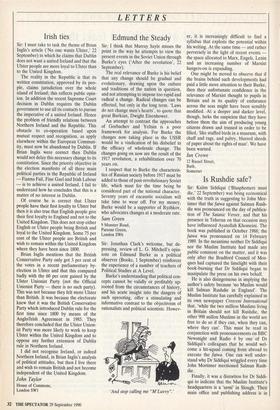LETTERS Irish ties
Sir: I must take to task the theme of Brian Inglis's article (`No one wants Ulster,' 22 September) in which he claims that Dublin does not want a united Ireland and that the Ulster people are more loyal to Ulster than to the United Kingdom.
The reality in the Republic is that its written constitution, approved by its peo- ple, claims jurisdiction over the whole island of Ireland; this reflects public opin- ion. In addition the recent Supreme Court decision in Dublin requires the Dublin government to use all its contacts to pursue the imperative of a united Ireland. Hence the problem of friendly relations between Northern Ireland and the Republic. This obstacle to co-operation based upon mutual respect and recognition, as apply elsewhere within the European Commun- ity, must now be abandoned by Dublin. If Brian Inglis were correct then Dublin would not delay this necessary change to its constitution. Since the priority objective in the election manifesto of all three main political parties in the Republic of Ireland — Fianna Fail, Fine Gael and Irish Labour — is to achieve a united Ireland, I fail to understand how he concludes that this is a matter of no interest in Dublin.
Of course he is correct that Ulster people have their first loyalty to Ulster but then it is also true that English people give their first loyalty to England and not to the United Kingdom. This does not stop either English or Ulster people being British and loyal to the United Kingdom. Some 75 per cent of the Ulster people are British and wish to remain within the United Kingdom where they have been since 1800.
Brian Inglis mentions that the British Conservative Party only got 3 per cent of the votes in a recent parliamentary by- election in Ulster and that this compared badly with the 60 per cent gained by the Ulster Unionist Party (not the Official Unionist Party — there is no such party). This was not because they felt more Ulster than British. It was because the electorate knew that it was the British Conservative Party which introduced Dublin rule for the first time since 1800 by means of the Anglo/Irish Agreement in 1985. They therefore concluded that the Ulster Union- ist Party was more likely to work to keep Ulster within the United Kingdom and to oppose any further extension of Dublin rule in Northern Ireland.
I did not recognise Ireland, or indeed Northern Ireland, in Brian Inglis's analysis of political attitudes, but then I live there and wish to remain British and not become independent of the United Kingdom.
John Taylor
House of Commons, London SW1


























































 Previous page
Previous page